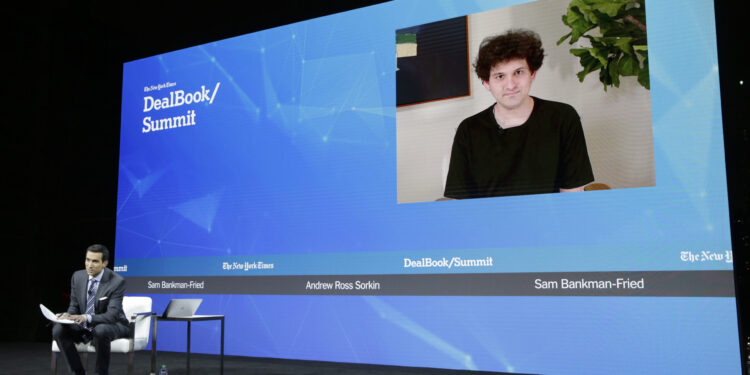New York Times financial columnist Andrew Ross Sorkin interviewed former FTX CEO Sam Bankman-Fried after his cryptocurrency empire imploded.
FTX recently filed for bankruptcy after users discovered that trading firm Alameda Research, a company run by former Bankman-Fried love interest Caroline Ellison, had allegedly been using funds from FTX to make bets. During the live-streamed interview at The New York Times’ DealBook Summit, which was attended virtually by The Daily Wire, the former billionaire denied that he intentionally commingled customers’ investments.
Sorkin told Bankman-Fried that he received multiple letters from FTX customers who accused the now-broke entrepreneur of stealing their life savings, prompting him to say that he was “deeply sorry about what happened.” After Sorkin pressed him on the alleged intertwining of funds, Bankman-Fried claimed that a “failure of oversight” on his part resulted in confusion rather than any desire to defraud investors for his own profit.
“I wasn’t running Alameda. I didn’t know exactly what was going on,” Bankman-Fried remarked. “I was nervous because of the conflict of interest of being too involved.”
The New York Times, which ran a puff piece claiming the disgraced entrepreneur’s “ambitions exceeded his grasp,” faced criticism for continuing the panel event with Bankman-Fried at the DealBook Summit, which also featured guests such as Meta CEO Mark Zuckerberg and Treasury Secretary Janet Yellen.
Bankman-Fried, who grew visibly nervous as the interview progressed, repeatedly insisted that the entire situation was a mistake rather than an attempt to defraud customers and investors. When Sorkin noted that media outlets have considered Bankman-Fried as a J.P. Morgan figure in the cryptocurrency space and asked whether his actions to support rival companies like BlockFi and Voyager were motivated by a desire to support his own enterprises, Bankman-Fried said that he had tried to “keep the industry stable,” but denied that his actions had an impact on FTX or Alameda Research.
BlockFi, which has since filed for bankruptcy, loaned a “couple hundred million” dollars to Alameda Research, according to Bankman-Fried, who told Sorkin that his lawyers were not particularly supportive of his decision to continue engaging with the media. In one message to Vox reporter Kelsey Piper, Bankman-Fried admitted that his persona as an “effective altruist” was largely a ruse meant to earn the trust of “woke westerners.”
Sorkin asked whether Bankman-Fried had been truthful throughout the conversation. He replied that “there are certainly times when I was acting as a representative, as a marketer for FTX.”
Bankman-Fried has indeed participated in several interviews since his company folded. When asked by cryptocurrency vlogger Tiffany Fong whether he created a backdoor that allowed him to move funds to Alameda Research without alerting other executives, the one-time wunderkind denied that he created any such mechanism. “That I can tell you is definitely not true. I don’t even know how to code,” the Massachusetts Institute of Technology graduate responded. “I literally never even opened the code for any of FTX.”
Bankman-Fried contributed nearly $39 million during the recent midterm elections to Democratic candidates, according to data from Open Secrets, which listed him as the nation’s sixth-largest individual midterm donor. He claimed that he also contributed “about the same amount” in dark money to Republicans. “The reason was not for regulatory reasons. It was because reporters freak the f*** out if you donate to Republicans,” he told Fong.











